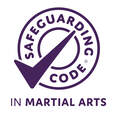Safe Practice Policy

Martial Arts are activities where safe practice is essential to help prevent injury. Children are particularly vulnerable as they are still developing mentally and physically, so training methods need to be modified as described below.
Warm Ups All activities should first include a thorough warm up which is appropriate for the activity taking place. To help reduce the risk of injury, specific attention should be paid to those muscle groups that will be used during later activity.
Martial Arts involving strikes, punches and kicks The risks include but are not limited to: sprained wrists, broken fingers from pad work and contact work creates a greater risk of concussion (brain injury); damage to internal organs and joints from heavy blows; injury from inappropriate stretching and other exercises.
Safe practice must include:
Above all, safe practice means having a suitably qualified and experienced KickboxUK coach is Qualified, insured, DBS and First Aid recognised who will ensure that children are not exposed to the above risks and who can make a training session enjoyable whilst maintaining the discipline essential to learning a Martial Art.
The duty of care and instruction is constantly monitored and adhered to by all our instructing/staff team.
Warm Ups All activities should first include a thorough warm up which is appropriate for the activity taking place. To help reduce the risk of injury, specific attention should be paid to those muscle groups that will be used during later activity.
Martial Arts involving strikes, punches and kicks The risks include but are not limited to: sprained wrists, broken fingers from pad work and contact work creates a greater risk of concussion (brain injury); damage to internal organs and joints from heavy blows; injury from inappropriate stretching and other exercises.
Safe practice must include:
- Training and competition only in club sanctioned kit and purchased from our club shop.
- Light contact sparring only, especially to the head. (Light contact means the technique is targeted but controlled so that whilst the opponent is touched the technique is not followed through). Expert advice from a neurosurgeon is that the use of helmets, mitts or foot pads does not eliminate the risk of brain injury from full contact strikes.
- Avoiding excessive stretching and ‘conditioning’ exercises such as press-ups on the knuckles, body contact conditioning or hitting heavy bags; the joints of children are still developing and can be damaged by these exercise
- Supervised sparring, by at least one brown/black belt adult student or a coaching team member when possible
Above all, safe practice means having a suitably qualified and experienced KickboxUK coach is Qualified, insured, DBS and First Aid recognised who will ensure that children are not exposed to the above risks and who can make a training session enjoyable whilst maintaining the discipline essential to learning a Martial Art.
The duty of care and instruction is constantly monitored and adhered to by all our instructing/staff team.
